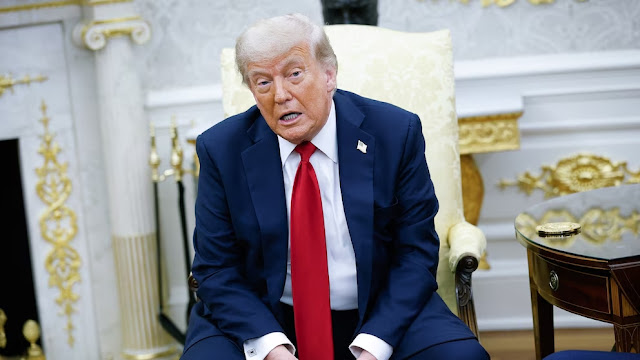President Donald Trump warned Monday that Russia will face "very severe" economic consequences, including sweeping tariffs and secondary sanctions, if it fails to agree to a ceasefire with Ukraine within 50 days. Speaking from the Oval Office alongside NATO Secretary-General Mark Rutte, the president made clear that his administration is preparing to exert maximum economic pressure on Moscow to bring an end to the ongoing war.
“We’re going to be doing very severe tariffs if we don’t have a deal in 50 days,” Trump said during the joint appearance.
The centerpiece of the administration’s new strategy is a proposed 100 percent secondary tariff on nations that continue to do business with Russia. The measure is designed to discourage third-party countries from providing Russia with economic lifelines or circumventing existing sanctions.
“These secondary tariffs are going to be very strong,” Trump said. “Anyone doing business with Russia is going to pay a heavy price.”
The announcement marks a significant escalation in U.S. economic pressure on Russia and comes as the war in Ukraine approaches its fourth year. Despite multiple rounds of international sanctions and widespread condemnation, Russian forces continue to occupy parts of eastern and southern Ukraine, and peace negotiations remain stalled.
NATO Secretary-General Rutte, who has taken on a more active diplomatic role in coordinating Western support for Ukraine, stood beside Trump as he detailed the evolving U.S. approach. Rutte confirmed that under a new arrangement, NATO will serve as a conduit for large-scale arms transfers from the U.S. to Ukraine.
“NATO will facilitate the purchase and delivery of American weapons to Ukraine,” Rutte said. “It’s essential that we maintain Ukraine’s ability to defend itself and pressure Russia to return to the negotiating table.”
Trump emphasized that Ukraine’s allies will bear the cost of the weapons, reinforcing his long-held stance that Europe must pay more for its own defense.
“We are going to be sending them weapons, and they’re going to be paying for them,” Trump said, referring to NATO countries.
Under the deal, Ukraine is expected to receive significant quantities of missiles, air defense systems, and ammunition. Rutte added that the scale of the arms package is intended to change the strategic calculations in the Kremlin.
“President Putin must reconsider his position. Continuing this war will only increase the cost for Russia,” Rutte warned.
Trump’s proposed 100 percent tariffs represent a sharp contrast with a bipartisan sanctions package making its way through the U.S. Senate. That bill, co-sponsored by Senators Lindsey Graham (R-SC) and Richard Blumenthal (D-CT), would impose a punitive 500 percent tariff on goods imported from countries that continue to purchase Russian energy and other key exports.
However, Trump signaled skepticism about the need for the Senate measure.
“I’m not sure we need it,” he said. “It could be very useful, we will have to see.”
Senate Majority Leader John Thune (R-SD) was expected to meet with the president later Monday to discuss the legislation and attempt to bridge the growing gap between Congress and the White House on how best to isolate Russia.
Whether Trump’s ultimatum to Moscow will lead to a breakthrough in peace talks remains to be seen. But with the clock now ticking on a 50-day deadline, the White House has signaled it is prepared to take dramatic steps to force Russia back to the negotiating table—or make it pay a steep economic price.











